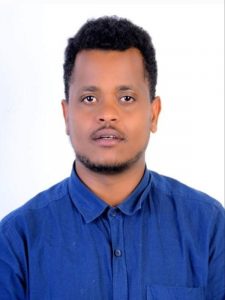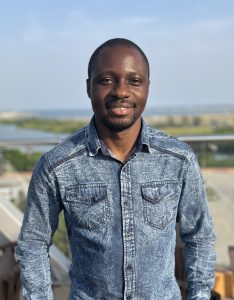Postdoctoral Research Fellows

Dr Andrew Ndlovu
Andrew has a background in bioinformatics and molecular ecology, and his research interests are seagrass ecological transcriptomics and seagrass as a nature-based climate solution. He is using ecological transcriptomics to investigate the functional responses of the dominant and endangered seagrass species in Southern Africa, Zostera capensis, under climate change scenarios through laboratory experiments. Seagrasses are increasingly recognized as globally significant blue carbon stocks. Andrew’s post-doctoral work also focuses on measuring blue carbon stocks in meadows of Z. capensis. Such data are useful in understanding the seagrass’s role in climate change mitigation and adaptation, highlighting their importance and the urgency for their conservation. He is particularly interested in investigating the biotic and abiotic drivers of the variability in measured seagrass blue carbon stocks.

Dr Jonathan Müller
Jonathan has a background in environmental sciences and did a PhD at the Weizmann Institute of Science, studying tree energy management under extreme drought and the poorly understood leaf-scale mechanism at the basis of non-evaporative canopy cooling. This mechanism is crucial for the continued existence of forests under a warmer and drier climate. During this project, he designed, built and deployed entire novel measurement systems in harsh field conditions and developed advanced data processing techniques and substantially. His postdoc research is to scale up from trees to ecosystem carbon and energy fluxes in a study with a unique comparison between the climate change mitigation potential of different land use scenarios, with the aim to identify the balance between climate warming and cooling effects of land use changes. Through his wide set of interests, Jonathan has gathered a range of skills from scientific to technical skills (including programming, sensor development), and in his free time he enjoys travelling and photography.

Dr Laique Djeutchouang
Laique is a researcher with expertise spanning mathematics, advanced statistics, scientific computing programming, machine learning (ML), physical oceanography, and atmosphere science, holding a PhD from the University of Cape Town’s Marine and Antarctic Research Centre for Innovation and Sustainability. While broadly interested in various applications of Artificial Intelligence (AI), particularly ML in remote sensing and Earth System data science, Laique‘s research passion lies in leveraging AI for climate change mitigation strategies, specifically carbon dioxide removal. Laique‘s doctoral research focused on leveraging ML to develop a novel scale-sensitive sampling approach to Southern Ocean CO2, enhancing our understanding of human-induced CO2 uptake by the ocean. Proficient in ML techniques such as artificial neural networks and decision tree-based algorithms including Extreme Gradient Boosting and Gradient Boosting Machine, Laique excels in surface ocean CO2 reconstructions based on observational, satellite, and reanalysis data or model simulations. As a postdoctoral research fellow at Stellenbosch University’s School for Climate Studies, Laique‘s work focuses on but is not limited to, setting up a scale-sensitive observations-based reconstruction of air-sea CO2 fluxes in the southern African coastal zone and regional ocean environment. Key objectives include identifying temporal and spatial scale sensitivities of ocean CO2 observations, proposing optimized sampling programs, and developing regional air-sea CO2 flux reconstructions using ML ensemble-based approaches.

Dr Casey Broom
Casey has a background in marine and freshwater thermal physiology and ecology. His research interests include aquatic ecosystem conservation, restoration, and resilience in the face of multiple stressors. His current work investigates global research and case studies of best practises to understand adaptation to climate change scenarios in freshwater systems within the South African context. He is using evidence-based approaches with the aim to guide policy and ensure the resilience of our vulnerable rivers, wetlands and waterways. South Africa’s freshwater systems are imperiled by multiple stressors, many of which are a direct effect of, or exacerbated by, climate change. Casey’s work will bring together knowledge from multiple disciplines to ensure the sustainability of our freshwater biodiversity, habitats and ecosystem resources.

Dr Duduzile Ngwenya
Duduzile has a background in Environmental Science and Restoration Ecology. Her research interests include using transdisciplinary research approaches to solve societal-based problems, consequently, her research interests cross disciplinary boundaries and extend beyond academia. Her current research focuses on assessing the environmental impacts of collecting biomass from sites cleared of alien invasive species to supply value-added industries such as sawmills, agriculture, and bioenergy industries. Those controlling the spread of alien invasive species often oppose the involvement of value-added industries in alien clearing programmes. They fear such involvement could aggravate the problem for various reasons and are, therefore against collecting biomass from cleared sites. Thus, assessing the impacts of value-added industries will help to put the large volumes of biomass generated from clearing alien invasive species to good use while the spread of alien invasive species is controlled. As a result, the research findings will guide the framing of harmonised policies and investments in the fields of the emerging bio-economy and policies around the control and use of biomass from alien invasive species. This will create an intrinsic value for the alien biomass, conservation of biodiversity, and the alien-clearing programmes.

Dr Ewunetu Gonete
Ewunetu is a postdoctoral researcher at the School for Climate Studies, Stellenbosch University, working within the Horizon Europe–funded MarginUp project and the Cluster of Excellence for Nature-Based Solutions. He holds a PhD in Forest and Livelihoods and did his PhD dissertations on improving traditional smallholder plantations charcoal/biochar production system for increased livelihood and lower carbon emissions in subtropical regions in eastern Africa. Currently, his postdoc research focuses on developing viable business models for biochar value chains and assessing their socioeconomic impacts in South Africa and beyond. With an emphasis on woody biomass from invasive alien trees, Dr. Gonete investigates how biochar can serve as a nature-based solution for climate change mitigation and adaptation, land restoration, and rural livelihoods. Dr. Gonete is also exploring carbon market dynamics, production costs, and the potential for biochar to generate co-benefits such as soil improvement and livelihood enhancement. This will support the transition to low-carbon economies, promote the productive use of invasive species, and contribute to improving soil health and livelihoods and lay the groundwork for impactful biochar applications and scalable carbon dioxide removal (CDR) strategies, in both local and international contexts. His broader research interests include climate-smart agriculture, biochar, low-carbon emission strategies, and the role of forestry and agroforestry in livelihood diversification, food security improvements, biodiversity conservation and building climate-resilient farming system.

Dr Blessing Afolayan
Dr Afolayan has a background in petroleum geoscience and completed his PhD at the University of the Western Cape. His research interests include petrophysics and formation evaluation, seismic interpretation, static modeling, and dynamic modeling of carbon dioxide storage in geological reservoirs. He also have passion for adapting Artificial Intelligence (AI) into climate change mitigation strategies. As a postdoctoral research fellow at Stellenbosch University’s National Institute for Theoretical and Computational Sciences (NITheCS) and School for Climate Studies (SCS), his work focuses on the applications of deep learning techniques to predict carbon dioxide trappings in geological reservoirs, with key objectives including incorporating physics-informed learning to density-dependent flow models, and effects of different regularization techniques on deep learning models. Furthermore, he is also working on creating a nexus between geological and groundwater models. Dr Afolayan’s work will be adding insights into derisking carbon dioxide storage projects, and improving groundwater flow models through incorporation of geological modeling workflows.

Dr Ntsikelelo Yalezo
Ntsikelelo has a background in theoretical and applied chemistry, applied mathematics, water and wastewater, and hands-on knowledge in the development of supervised learning algorithms like regression (linear and logistic), K-NN, decision trees, and random forests, as well as unsupervised learning algorithms like K-means clustering, neural networks (Deep Learning), and fuzzy logic systems. Ntsikelelo possesses a doctorate in chemical engineering from the University of Pretoria. His responsibilities and interests as a research fellow include developing a machine learning model for the spatial and temporal reconstruction of the multidecadal variability and trends of regional CO2 fluxes in coastal regions, as well as critically evaluating physical and biogeochemical processes that influence the uncertainties in the reconstructed CO2 products. Additionally, his research looks at the feasibility of strategies aimed at Carbon Dioxide Removal (mCDR) from the atmosphere by using the ocean.
